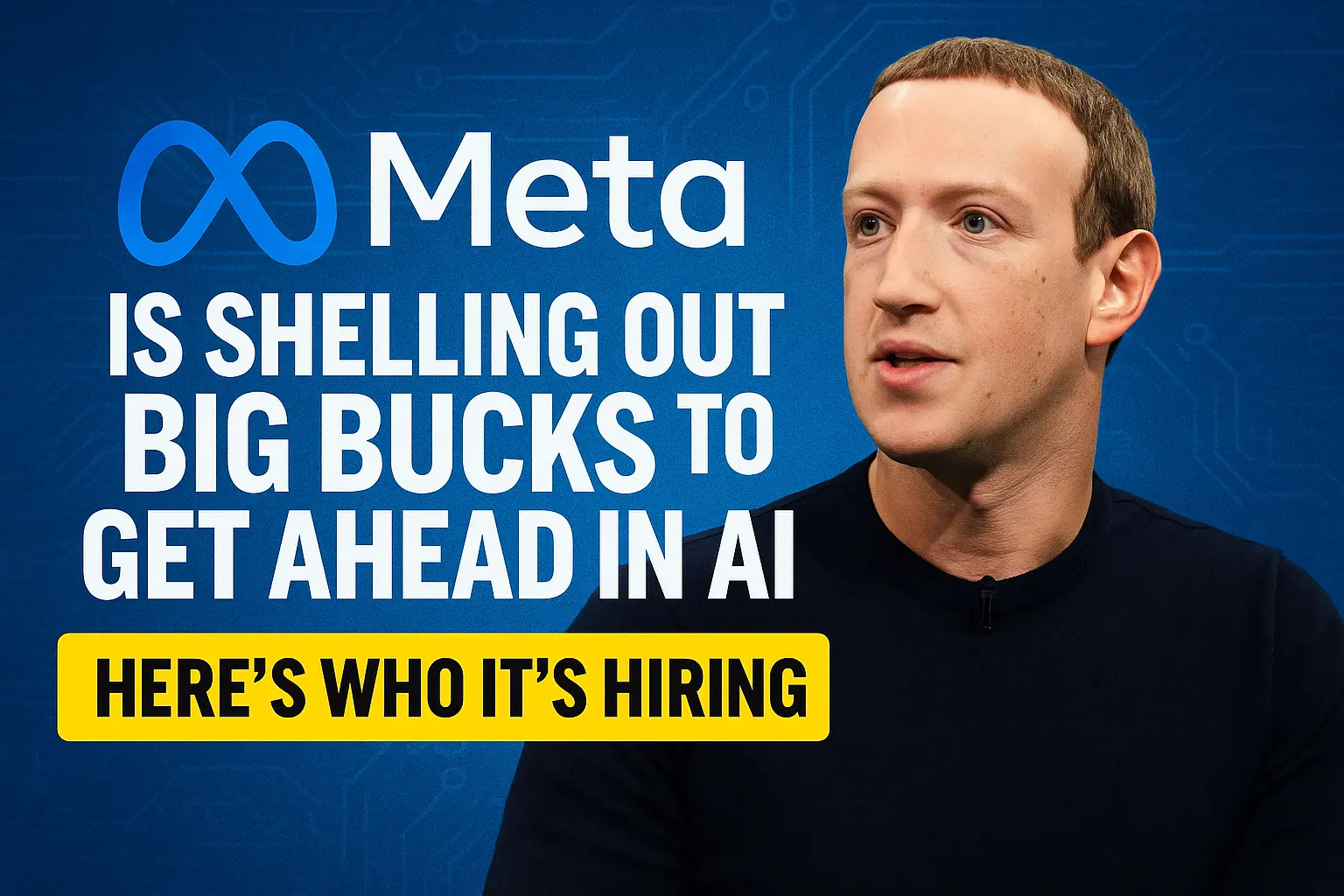Meta is investing billions to build a “superintelligence” team aimed at beating OpenAI and Google. Here’s who they’ve hired — and why it matters.
Table of Contents
Meta Is Shelling Out Big Bucks to Get Ahead in AI. Here’s Who It’s Hiring
Meta CEO Mark Zuckerberg has launched an all-out hiring blitz to assemble a world-class team at its newly established Meta Superintelligence Labs (MSL)—aimed at securing artificial superintelligence (ASI) superiority. With offers reportedly reaching nine-figure signing bonuses, Meta is positioning itself to challenge OpenAI, Google DeepMind, and others. But who’s jumping ship—and what’s at stake if Meta succeeds?
🧩 Why Meta Is Betting Big on AI Talent
1. Recovering from the Metaverse Setback
Meta’s metaverse investment faltered, prompting a pivot to AI as the next frontier. The company is repositioning itself from social media giant to an AI powerhouse.
2. Ambition for Artificial Superintelligence
Zuckerberg envisions a future where AI surpasses human-level general reasoning—and Meta is racing to lead.
This ambition hinges on top-tier talent, not just infrastructure.
3. Llama 4 Lessons
Meta’s internal messaging is blunt: access to hardware isn’t enough—the right team is key. After reviews of Llama 4’s disappointing rollout, a crackdown on talent gaps followed.
📆 Timeline of the AI Talent Blitz
- June 2025: Meta invests $14.3 billion for a 49% stake in Scale AI, along with hiring founder Alexandr Wang as Chief AI Officer.
- June‑July 2025: Meta forms the Meta Superintelligence Labs, led by Wang, Nat Friedman, and others, consolidating FAIR and product teams under one mission-focused unit.
- July 2025: Shengjia Zhao, key contributor to ChatGPT & GPT-4, named Chief Scientist of MSL, to lead research agenda alongside Zuckerberg and Wang.
🧠 Meet the Meta Superintelligence Team
Meta’s team includes dozens of elite researchers from OpenAI, DeepMind, Apple AI labs, and beyond:
- Shengjia Zhao: ChatGPT co‑creator, now Chief Scientist of MSL.
- Alexandr Wang: Former Scale AI founder now Chief AI Officer at Meta.
- Nat Friedman: Ex-GitHub CEO co-leading MSL product and research strategy.
- Additional hires: contributors to GPT‑4.o, o1 reasoning models, multimodal research, RL and chain-of-thought systems—including Trapit Bansal, Shuchao Bi, Jiahui Yu, Huiwen Chang, Hongyu Ren, Joel Pobar, Jack Rae, and others from OpenAI, DeepMind, and Anthropic.
Roughly half of the team are PhDs; 40% come from OpenAI; 20% from DeepMind; 15% from Scale AI; 75% are first-generation researchers, and many are from China. Reported compensation ranges from $10 million to $100 million per year, with some offers rumored as high as $300 million over four years.
📉 Meta’s Tension with OpenAI & the Talent War
OpenAI CEO Sam Altman criticized Meta’s financial hiring strategy as “missionaries vs. mercenaries,” highlighting cultural differences over pay-driven recruitment. Google’s Demis Hassabis (DeepMind CEO) called Meta’s poaching rational—Meta is “behind” and under pressure to catch up.
💼 Financial & Stock Market Impacts
Meta’s aggressive talent funnel coincides with strong financial momentum:
- Stock prices hit all-time highs (e.g., $738.09 close on June 30, 2025), buoyed by AI investment optimism.
- Meta plans to invest up to $70 billion in AI data centers—and a 1-gigawatt Prometheus cluster for large-scale model training.
🎯 Why Meta Is All-In on Talent Over Tech Alone
- Talent > hardware: MSL hiring strategy centers on elite individuals rather than speculative infrastructure alone.
- Rebuilding a legacy: Meta plans to be synonymous with AGI innovation, not just the metaverse or social networks.
- Open-source leadership: Unlike closed models from Google or OpenAI, Meta pledges to open-source its models long-term—a strategic differentiator.
🔍 Expert Commentary
- D.A. Davidson’s Gil Luria: “That’s the Llama 4 lesson — chip scale means nothing without the right team”
- Laszlo Bock (ex-Google HR): Meta’s $100M+ offers are a bargain given their revenue scale and strategic importance.
- NGO analysts: The risk isn’t just tech failure—also losing focus on mission & ethical alignment via culture-driven approaches.
❓ Frequently Asked Questions
Q: What is Meta Superintelligence Labs?
A: Launched in June 2025, MSL is Meta’s dedicated AI division for pursuing ASI, centralizing all AI efforts including FAIR, Llama teams, and new strategic hires.
Q: Who is leading the superintelligence initiative?
A: Alexandr Wang serves as Chief AI Officer, with Shengjia Zhao as Chief Scientist. Nat Friedman co-leads product and applied research strategy.
Q: How much is Meta paying in AI hiring?
A: Compensation packages reportedly range from $10 million to over $300 million across multi‑year terms, with signing bonuses reportedly up to $100 million for top recruits.
Q: How is OpenAI responding?
A: OpenAI CEO Sam Altman condemned the approach as culturally misaligned, while assuring staff retention remains a priority.
Q: Why did Meta make such a huge investment in Scale AI?
A: Meta purchased a 49% stake in Scale AI ($14.3B) to secure founder Alexandr Wang and accelerate development of training pipelines for ASI.
Q: Will this strategy succeed?
A: Analysts remain cautiously optimistic. While infrastructure and talent are in place, execution—especially around model quality like Llama 4 and forthcoming Behemoth—is key
